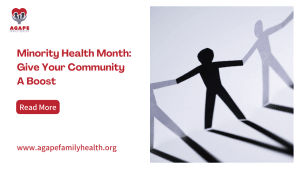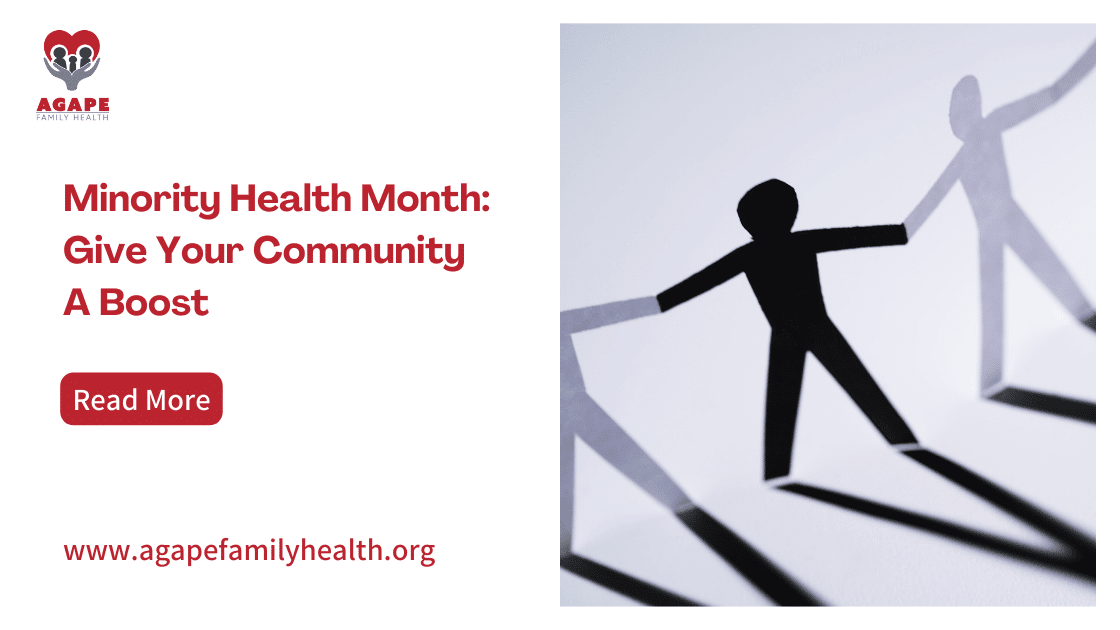
April is National Minority Health Month, a time to raise awareness about the health disparities that continue to affect racial and ethnic minority groups in the United States. While great strides have been made in recent years to close the gap, significant disparities still exist in a number of key areas, including access to care, quality of care, and health outcomes. These disparities are often the result of factors like poverty, racism, and discrimination.
During National Minority Health Month, we recommit ourselves to working towards health equity for all. This means ensuring that everyone has the opportunity to live a healthy life, regardless of their background or circumstance. We also remember that health is more than just the absence of disease; it is a state of complete physical, mental, and social well-being. By working together, we can make sure that everyone has the chance to reach their fullest potential.
Give Your Community A Boost
April is National Minority Health Month, and this year’s theme is “Give Your Community a Boost!” The goal of the campaign is to raise awareness of health disparities and encourage everyone to take action to improve the health of their community. One way to do this is to get involved in your local community. Attend community events, volunteer your time, and support local businesses.
You can also advocate for policies that will improve the health of your community. For example, you can support initiatives to improve access to healthy food, increase funding for public health programs, or create walkable and bikeable communities. By working together, we can make our communities healthier for everyone.
Racial and Ethnic Groups More Susceptible to COVID-19
The Centers for Disease Control and Prevention (CDC) released data showing that some racial and ethnic minority groups are at increased risk of getting sick from COVID-19. The data show that Black or African American, Hispanic or Latino, and American Indian or Alaska Native people are disproportionately affected by the disease. These groups are more likely to be hospitalized and to die from COVID-19 than people in other racial and ethnic groups.
The CDC urges all people, regardless of race or ethnicity, to take steps to protect themselves from the disease. This includes washing your hands, wearing a face mask, and maintaining social distancing. By working together, we can help prevent the spread of COVID-19 and keep everyone safe.
How to Raise Awareness for National Minority Health Month
1. Get involved in your local community
April is National Minority Health Month, and it’s a great time to get involved in your local community and raise awareness about this important issue. You can do this in many ways, from organizing a health fair to giving a presentation at your child’s school. It’s also important to remember that minority health is not just about race or ethnicity – it also includes socioeconomic status, sexual orientation, gender identity, and more.
By raising awareness about minority health issues, we can make a difference in the lives of those most affected by them. So get involved this April and help spread the word about National Minority Health Month.
2. Raise awareness for COVID-19 vaccination
The pandemic has disproportionately impacted people of color in terms of infection and mortality rates. One way to help protect vulnerable populations is to vaccinate them against COVID-19. Unfortunately, much misinformation is circulating about the vaccine, and many people are hesitant to get vaccinated.
This April, let’s use National Minority Health Month to raise awareness about the importance of vaccination and help bust some myths about the vaccine. Together, we can help protect our communities and save lives.
3. Advocate for healthcare policies
In the United States, health disparities among racial and ethnic minority groups are well-documented. Minority communities experience higher rates of chronic disease, poverty, and exposure to environmental toxins, which all contribute to poorer health outcomes.
One way to do this is to advocate for local, state, and federal healthcare policies that address the underlying causes of poor health in minority communities. These policies could include increasing funding for disease prevention and wellness programs, expanding access to affordable housing and healthy food options, and implementing job training programs that lead to livable wages.
By improving the social determinants of health, we can make progress toward eliminating disparities and ensuring that everyone has the opportunity to live a healthy life.
Make Communities Healthier for Everyone
Agape Family Health is committed to providing quality health care to all community members, regardless of race or ethnicity. This commitment is evident in our participation in National Minority Health Month. Every April, we join other organizations across the country to raise awareness about the health disparities affecting minority populations. We also use this month to educate our patients and staff about the importance of reducing these disparities.
Through our outreach efforts, we are working to ensure everyone has access to the resources they need to live a healthy life. We are proud to be a part of National Minority Health Month and will continue our efforts to promote health equity for all.



